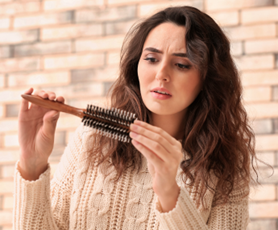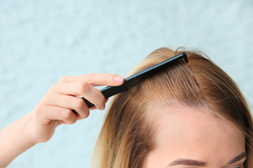Best Hair Loss Treatments for Females
Best Hair Loss Treatments for Females –
How To Regrow Thinning Hair :
Reasons for Hair Fall In Females
It’s important to address hair loss as soon as possible, as it can have a significant impact on your self-esteem and overall well-being. By understanding the causes of female hair loss and seeking appropriate treatment, you can take steps to restore your hair and regain your confidence. Hair loss (female pattern baldness) is a common problem among women and can be caused by various factors. Understanding the causes of hair loss can help you take the necessary steps to prevent or treat it. Here are some common causes of female hair loss, and also the Best Hair Loss Treatments for Females
Hormonal Causes
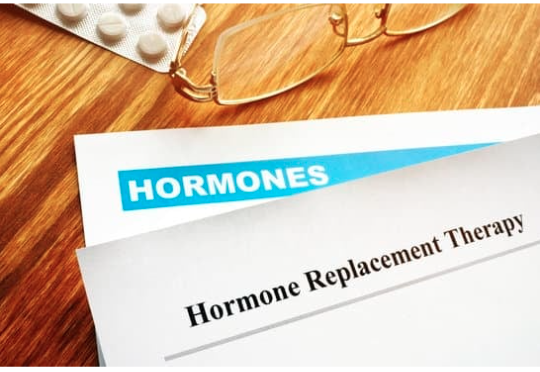 Hormonal changes can cause hair loss in women. Hormones such as estrogen and progesterone play a vital role in hair growth. Any imbalance in these hormones can lead to hair loss. For example, during pregnancy, the increase in estrogen levels can cause hair to grow thicker and healthier. However, after childbirth, the sudden drop in estrogen levels can cause hair loss. Hormonal changes during menopause can also cause hair loss.
Hormonal changes can cause hair loss in women. Hormones such as estrogen and progesterone play a vital role in hair growth. Any imbalance in these hormones can lead to hair loss. For example, during pregnancy, the increase in estrogen levels can cause hair to grow thicker and healthier. However, after childbirth, the sudden drop in estrogen levels can cause hair loss. Hormonal changes during menopause can also cause hair loss.
Genetic Causes
Female hair loss can also be caused by genetics. Androgenetic alopecia, also known as female pattern baldness, is a genetic condition that causes hair loss in women. This condition is caused by a combination of genetic and hormonal factors. Women with a family history of hair loss are more likely to develop this condition.
Aging and Menopause
As you age, your hair becomes thinner and weaker. This is because the hair follicles shrink, leading to less hair growth. Menopause can also cause hair loss due to hormonal changes. The decrease in estrogen levels during menopause can cause hair to become thinner and more brittle.
In conclusion, female hair loss can be caused by various factors, including hormonal changes, genetics, aging, and menopause. Understanding the causes of hair loss can help you take the necessary steps to prevent or treat it. If you are experiencing hair loss, it is important to consult a healthcare professional to determine the underlying cause and receive appropriate treatment.
Hair Loss Treatments and Solutions
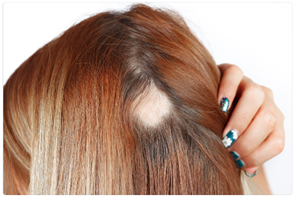 Medical Conditions Associated with Hair Loss
Medical Conditions Associated with Hair Loss
If you are experiencing hair loss, it may be due to an underlying medical condition. Here are some of the medical conditions that can cause hair loss in women:
- Hypothyroidism: This condition occurs when your thyroid gland is not producing enough hormones. Hair loss is a common symptom of hypothyroidism.
- Polycystic ovary syndrome (PCOS): PCOS is a hormonal disorder that can cause hair loss in women.
- Alopecia areata: This is an autoimmune disorder that causes hair loss in patches.
- Scalp infections: Fungal or bacterial infections of the scalp can cause hair loss.
- Anemia: If you have anemia, your body is not producing enough red blood cells, which can lead to hair loss.
Medications That May Cause Hair Loss
Certain medications can also cause hair loss in women. Here are some of the medications that may cause hair loss:
- Chemotherapy drugs: Chemotherapy drugs are designed to kill rapidly dividing cells, which includes hair follicles. This can cause hair loss all over the body.
- Birth control pills: Some women may experience hair loss while taking birth control pills.
- Blood thinners: Blood thinners can cause hair loss in some women.
- Antidepressants: Some antidepressants can cause hair loss as a side effect.
- Steroids: Steroids can cause hair loss in some women.
If you are experiencing unexplained hair loss, it is important to talk to your doctor. They can help determine the underlying cause and recommend treatment options. In some cases, hair loss may be reversible with treatment.
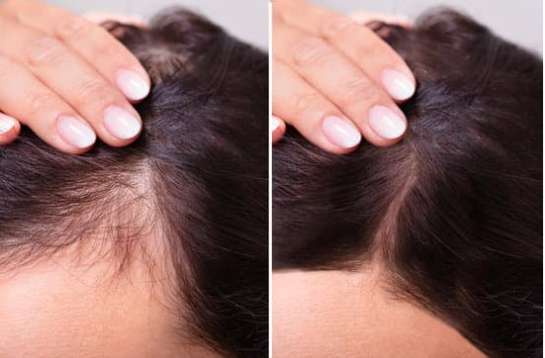
Can Female Hair Loss Grow Back?
Treating Female Pattern Hair Loss
If you are experiencing hair loss as a woman, there are several treatments available to help you regrow your hair. These treatments can be divided into three categories: topical treatments, oral treatments, and hair transplantation.
Best Hair Loss Treatments for Females:
Topical Treatments
Topical treatments are applied directly to the scalp and are designed to stimulate hair growth. Some popular topical treatments include:
Minoxidil: This medication is available over-the-counter and is applied to the scalp twice daily. It works by increasing blood flow to the hair follicles, which can help stimulate hair growth.
Corticosteroids: These medications are often used to reduce inflammation and can be applied topically to the scalp. They can help reduce inflammation in the hair follicles, which can help promote hair growth.
Oral Treatments for Female Hair Loss
Oral treatments are taken in pill form and are designed to promote hair growth from the inside out. Some popular oral treatments include:
Finasteride: This medication is available by prescription only and is taken once daily. It works by blocking the production of DHT, a hormone that can cause hair loss.
Iron supplements: Iron deficiency is a common cause of hair loss in women. Taking iron supplements can help promote hair growth by addressing this deficiency.
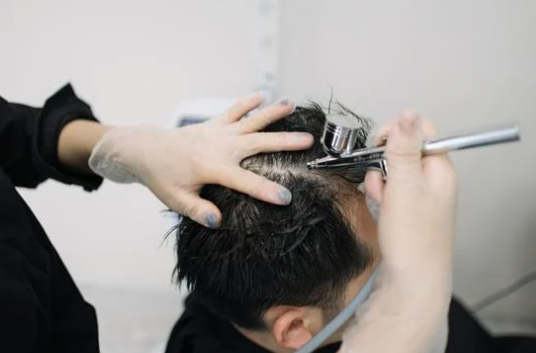 Hair Transplantation
Hair Transplantation
Hair transplantation is a surgical procedure that involves transplanting hair follicles from one part of the scalp to another. This procedure is typically reserved for women who have significant hair loss and have not responded to other treatments.
While there are many treatments available for female hair loss, it is important to consult with a healthcare professional to determine the best course of action for your individual needs.
Hair-Fall Reasons in Females:
Prevention and Maintenance
Hair loss can be a frustrating experience for women. While there are many treatments available to help manage hair loss, prevention and maintenance are key to keeping your hair healthy. Here are some tips to help prevent hair loss and maintain healthy hair.
Lifestyle Changes
Making some simple lifestyle changes can help prevent hair loss. Here are some tips:
- Reduce stress: Stress can cause hair loss. Try to manage stress through exercise, meditation, or other relaxation techniques.
- Eat a healthy diet: A healthy diet can help keep your hair healthy. Make sure to include plenty of protein, vitamins, and minerals in your diet.
- Avoid harsh chemicals: Harsh chemicals can damage your hair and cause hair loss. Avoid using products with harsh chemicals, and be gentle when styling your hair.
- Protect your hair: Protect your hair from the sun, wind, and other environmental factors that can damage your hair.
 Vitamins and Supplements: Which Vitamin Deficiency Causes Hair Loss
Vitamins and Supplements: Which Vitamin Deficiency Causes Hair Loss
Certain vitamins and supplements can help prevent hair loss and promote healthy hair growth. Here are some vitamins and supplements to consider:
- Biotin: Biotin is a B vitamin that can help promote healthy hair growth.
- Iron: Iron deficiency can cause hair loss. Make sure to get enough iron in your diet or consider taking an iron supplement.
- Vitamin D: Vitamin D can help promote healthy hair growth.
- Omega-3 fatty acids: Omega-3 fatty acids can help promote healthy hair growth and reduce inflammation.
If you are an elderly woman experiencing hair loss, it is important to consult with your doctor before taking any supplements or making any significant changes to your diet or lifestyle. Your doctor can help you determine the best course of action for your specific situation.
Remember, prevention and maintenance are key to keeping your hair healthy. By making some simple lifestyle changes and considering certain vitamins and supplements, you can help prevent hair loss and promote healthy hair growth.
Best Hair Loss Treatments for Females
Questions and Answers
If you are experiencing hair loss, you may have some questions about the condition. Here are some common questions and answers that may help you understand more about female hair loss.
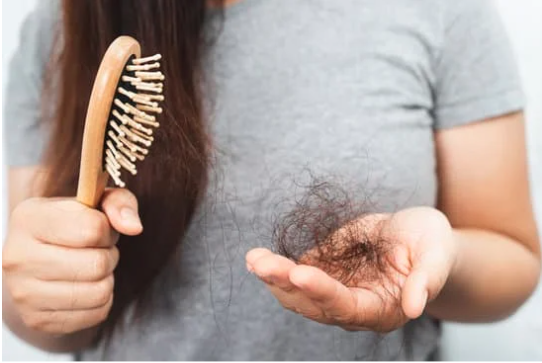
Q: What causes female hair loss?
A: Female hair loss can be caused by a variety of factors, including genetics, hormonal changes, medical conditions, and certain medications. It’s important to consult with a healthcare professional to determine the underlying cause of your hair loss.
Q: Is female hair loss reversible?
A: In some cases, female hair loss can be reversed with treatment. However, the success of treatment depends on the underlying cause of the hair loss. It’s important to seek medical advice as soon as possible if you are experiencing hair loss.
Q: Hair Loss natural remedies for women ?
A: While there are many natural remedies that are claimed to help with hair loss, there is limited scientific evidence to support their effectiveness. Some natural remedies that may be worth trying include scalp massage, essential oils, and a healthy diet.
Q: Can stress cause female hair loss?
A: Yes, stress can be a contributing factor to female hair loss. When you experience stress, your body releases hormones that can affect hair growth. If you are experiencing hair loss due to stress, it’s important to find ways to manage your stress levels.
Q: Is hair loss a sign of a serious medical condition?
A: Hair loss can be a symptom of a serious medical condition, such as thyroid disease or lupus. If you are experiencing hair loss, it’s important to consult with a healthcare professional to rule out any underlying medical conditions.
Causes of Female Hair Loss
Women’s hair loss – treatments and solutions. Female hair loss, medically termed as alopecia, is a condition that affects women of all ages. It can be distressing, affecting their self-confidence, mental health, and quality of life. Alopecia is not only restricted to hair loss on the scalp but can also occur on eyebrows, eyelashes, and other areas of the body.
1. Genetics
Genetics plays a significant role in female hair loss. Androgenetic alopecia is the most common cause of hair loss in women. This type of hair loss is linked to hormones and inherited genes. Women with a family history of female pattern baldness are more likely to experience hair loss.
2. Hormonal changes
Many hormonal changes can trigger hair loss in women, including menopause, pregnancy, and childbirth. These changes significantly affect the hair growth cycle and cause temporary hair loss. Hormonal imbalances, such as thyroid problems and Polycystic Ovary Syndrome (PCOS), can also cause hair loss.
3. Medical Conditions and Medications
Several medical conditions such as lupus, alopecia areata, and iron deficiency anemia can lead to hair loss. Some medical treatments such as radiation therapy and chemotherapy can also cause extreme hair loss.
4. Stress
Stress can be a significant contributor to hair loss. Extreme stress can lead to hair thinning and hair fall-like symptoms.
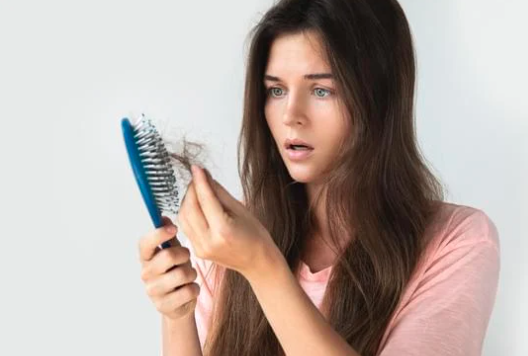 Effects on Mind and Body:
Effects on Mind and Body:
Hair loss can affect women emotionally and psychologically. Women typically perceive their hair as a critical aspect of their appearance, and losing their hair can negatively impact a woman’s self-esteem, self-confidence, and mental health.
The psychological effects of hair loss can cause depression, anxiety, and a decrease in quality of life. Women might feel unattractive or unfeminine with their hair loss, leading to low self-esteem and posture. These negative emotions are often prolonged, affecting their relationships and work performance.
Hair loss can also cause physical effects. With a decrease in hair, women may feel colder, especially on their scalp. This effect can lead to complications such as scalp sunburn and scalp skin cancer.
Best Hair Loss Treatments for Females –
Possible Treatments and Cures:
1. Medications
There are several medications available to treat hair loss in women. Medicines like Minoxidil are FDA-approved to promote hair regrowth in women. This medicine typically comes in a liquid or foam formula and is applied to the scalp daily.
Hair loss caused by hormonal imbalances can be treated with medications that balance hormones, such as Hormone Replacement Therapy (HRT). However, HRT is not recommended for everyone and may have side effects.
2. Lifestyle changes
Making lifestyle changes such as practicing stress reduction techniques, exercising regularly, following a healthy diet, and getting enough sleep can help in improving hair growth and health.
3. Hair replacement and transplantation
Hair replacement and transplantation are common hair loss treatments for women. These treatments involve transplanting hair follicles from denser areas of the scalp to those that are thinning.
4. Wigs and Hairpieces
Wigs and hairpieces can supplement a woman’s hair loss. Opting for wigs provides a newfound sense of confidence, style, and individuality.
Hair loss can affect women of all ages but are more prevalent in older women. Women experiencing hair loss should consult a doctor to determine the underlying cause. A healthcare professional can offer a treatment plan that suits each individual’s unique needs, considering her health, age, and lifestyle.
Best Hair Loss Treatments for Females:
Conclusion
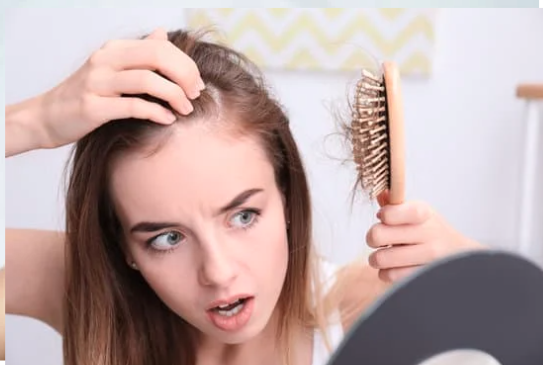
Female Pattern Baldness Information: Female hair loss is a common condition that affects many women. Hair loss can be caused by multiple factors, including genetics, hormonal changes, stress, and medical conditions. Hair loss can cause significant psychological and physical effects in women, reducing daily functioning and quality of life.
How to regrow hairline – female: Several treatments and cures are available to treat hair loss in women, including medications, lifestyle changes, hair replacement and transplantation, and wigs. Proper diagnosis and timely action can help prevent further hair loss and promote regrowth. Women experiencing hair loss must seek professional advice to determine the best treatment plan for their unique needs.

